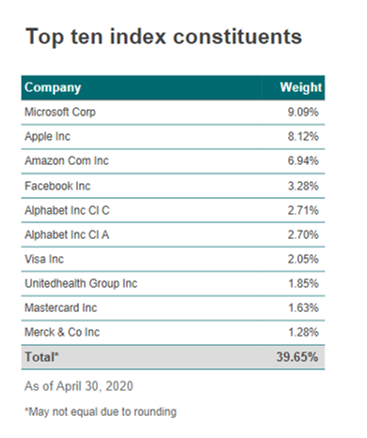The concentration level in the Russell 1000® Growth Index (Russell 1000® Growth) has been on the rise as a handful of mega cap stocks have increasingly dominated the index to eyebrow-raising levels. This is occurring because the index is market cap-weighted, meaning its constituents are weighted according to the total market capitalization or market value of its available common outstanding shares. Companies with the largest market caps will represent the highest weights in the index, meaning mega cap companies like Apple or Amazon will impact the performance of the overall index more than smaller capitalization companies. This method of weighting index constituents remains the most commonly-used today although other alternatively-constructed indexes are available in the marketplace.
In looking at the 533 constituents of the Russell 1000® Growth, the top 10 stocks have grown from 30.0% of the index as of year-end 2017 to 39.7% as of April 30, 2020. Of the constituents, the vast majority (518 stocks) are below the 1% threshold (typical for an index) while 15 stocks range from 1% - 9% of the index.[1]
It probably isn’t a huge surprise that the largest jumps were from tech and e-commerce companies. Microsoft’s weighting jumped by over 4% to 9.1% over the period noted above. Its stock soared as its CEO led the company's move to cloud computing and the development of one of the largest cloud infrastructures in the world. Amazon increased by 3.3% to 6.9% as e-commerce (and their cloud computing business) has grown exponentially over the last several years. The coronavirus pandemic further catapulted the company into the spotlight. Apple's weighting increased more modestly, by 1.3%, to 8.1%, yet the company garnered the second-largest spot on the top ten list. These three companies alone represented a lofty 24.2% of the index as of April 30. The rest of the top 10 companies include Facebook, Alphabet (the parent of Google), Visa, UnitedHealth Group, Mastercard, and Merck. Alphabet actually holds two spots on the index’s top 10 list. Its Class A shares offer voting rights while its Class C shares do not. (The reason for the two share classes was partly to preserve the control of Alphabet founders.)
 The Russell 1000® Growth is a subset of the Russell 1000® Index, which represents the largest 1,000 companies in the United States. Stocks within the Growth subset are selected based on a “probability” of growth as measured by the Institutional Brokers’ Estimate System (I/B/E/S) forecast of their medium-term growth (over a 2-year period) and sales per share historical growth (over a 5-year period). The index is completely reconstituted annually in June to ensure new and growing companies are included and that the represented companies continue to reflect growth characteristics. The reconstitution will capture market shifts from the past year. It is set to be more significant than usual with the coronavirus pandemic making sizable changes to equity markets, according to Bank of America.[2] Look for my follow-up blog post after the Russell rebalance is completed.
The Russell 1000® Growth is a subset of the Russell 1000® Index, which represents the largest 1,000 companies in the United States. Stocks within the Growth subset are selected based on a “probability” of growth as measured by the Institutional Brokers’ Estimate System (I/B/E/S) forecast of their medium-term growth (over a 2-year period) and sales per share historical growth (over a 5-year period). The index is completely reconstituted annually in June to ensure new and growing companies are included and that the represented companies continue to reflect growth characteristics. The reconstitution will capture market shifts from the past year. It is set to be more significant than usual with the coronavirus pandemic making sizable changes to equity markets, according to Bank of America.[2] Look for my follow-up blog post after the Russell rebalance is completed.
[1] https://www.ftserussell.com/
[2] "Expect a ‘Record-Breaking’ Russell Reconstitution BofA Says" By Joanna Ossinger of Bloomberg, May 12, 2020
Multnomah Group is a registered investment adviser, registered with the Securities and Exchange Commission. Any information contained herein or on Multnomah Group’s website is provided for educational purposes only and does not intend to make an offer or solicitation for the sale or purchase of any specific securities, investments, or investment strategies. Investments involve risk and, unless otherwise stated, are not guaranteed. Multnomah Group does not provide legal or tax advice.

